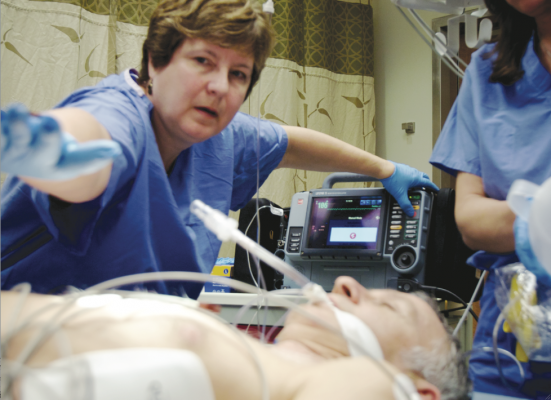
Photo courtesy of Physio-control PR photos
December 2, 2014 – Results of a new study challenge the current consensus in cardiology that peak myocardial edema only occurs just after a myocardial infarction. In the study, presented as a Late-Breaking Clinical Trial at the American Heart Association (AHA) Scientific Sessions 2014 and published simultaneously in the Journal of the American College of Cardiology (JACC), scientists discovered a second wave of swelling and inflammation occurs within a week of a heart attack.
The researchers from the Mount Sinai Heart at Icahn School of Medicine at Mount Sinai and Centro Nacional de Investigaciones Cardiovasculares Carlos III (CNIC) in Spain believe their identification of this second wave of inflammation may advance the use of cardiac magnetic resonance (CMR) imaging to better assess initial damage caused by a heart attack. Furthermore, it may enable the design of future targeted therapies that interrupt the two inflammatory reactions to better protect a patient’s heart muscle.
Previously, it was widely accepted that heart muscle responds in a stable and progressive way to a heart attack or blockage, with the response pattern starting right after the attack and lasting at least a week.
“Our study found that the inflammatory reaction of the heart post-heart attack is not stable or homogeneous,” says senior study author Borja Ibáñez, M.D., Ph.D., head of the Experimental Cardiology Group at CNIC and clinical cardiologist at the Hospital Clínico San Carlos in Spain. “In fact, we have identified that a new systematic and consistent two-wave inflammatory reaction occurs causing swelling and thickening of the heart muscle at two different times during a week’s time.”
The current research team first categorized this two-phase inflammatory response as an initial massive inflammatory reaction immediately after a myocardial infarction, accompanied by a massive increase in the myocardial tissue thickness that lasts a week. Subsequent observations, however, determined that a first wave of inflammation subsides a few hours after a heart attack, and then a second, separate wave of inflammation arises a week later.
“Our study shows the first evidence of the heart’s dual inflammatory reaction after a myocardial infarction,” says study author Valentin Fuster, M.D., Ph.D., director of Mount Sinai Heart at Icahn School of Medicine at Mount Sinai and general director of CNIC in Spain. “We now know the heart responds to a myocardial infarction in a different way than we once thought with the initial inflammatory reaction followed by a second reactive inflammatory wave. This new data may be truly paradigm-shifting for the future treatment of heart attack patients.”
In the preclinical study, researchers performed comprehensive imaging using advanced 3 Tesla CMR technology to study the myocardium’s inflammatory process, and later examined heart muscle tissue samples to assess its overall water content swelling.
Myocardial Edema After Ischemia/Reperfusion is Not Stable and Follows a Bimodal Pattern: Advanced Imaging and Histological Tissue Characterization Study to Challenge a Classical Dogma.
For more information: www.mountsinai.org


 January 05, 2026
January 05, 2026 









